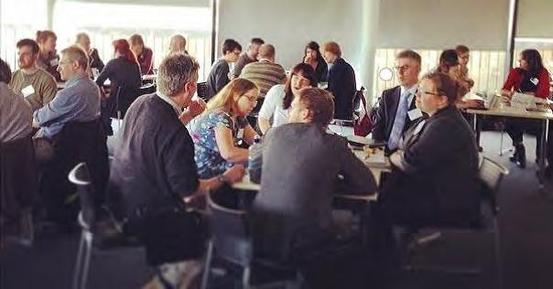Towards a Collaborative Strategy for sector information management (TACOS)
Information about the TACOS Seminar 14 May 2014
On 14 May 2014 the Council for British Archaeology (CBA) hosted a one-day World Café style seminar on behalf of FISH and HEIRNET at the University of York to discuss common issues facing the historic environment information sector and make progress towards a shared vision and agenda for historic environment information management.
|
Download the full report here
|
| ||||||
Aims
Topics
TACOS is built upon a ‘show and tell’ event (the NACHOS seminar) held at the British Museum in November 2012, which identified the need for integration of information sources in support of the National Heritage Protection Plan (NHPP).
The seminar investigated current historic environment information management practices and identified areas for improvement through cross-sector collaboration through three overarching themes:
Programme
Introduction to TACOS - Gill Grayson, Convenor of FISH & HEIRNET (Head of Heritage Data Management, English Heritage)
Session 1: Users & Reusers
Introduced by Martin Newman (IMSIG, English Heritage)
Session 2: Skills Development
Introduced by Edmund Lee (English Heritage)
Session 3: Information Systems & Technology
Introduced by Keith May (English Heritage)
Moving Forward & Close - Mike Heyworth (CBA Director)
Videos
The seminar brought together a diverse group of representatives from across the heritage sector. Each session included three keynote speakers and breakout groups that discussed key issues and potential solutions.
To find out more about this seminar and to listen to the video-recorded sessions available online, please go to the Chartered Institute for Archaeologists website: http://www.archaeologists.net/groups/imsig/tacos
Report
TACOS Report Proceedings from the event, including issues raised during discussion sessions, virtual participation via social media and formal feedback, have been compiled into a report by the CBA. The report will be used to guide a forward plan to develop a common research agenda and strategy for UK historic environment information management in the future including action points to be taken forward by representatives of the Forum on Information Standards in Heritage (FISH), the Historic Environment Information Resources Network (HEIRNET) and various historic environment sector working groups such as the Chartered Institute for Archaeologists Information Management Special Interest Group (IMSIG).
- Encourage discussion between different groups that produce and manage historic environment information from across the sector (professional, research and voluntary) to identify common goals and issues.
- Develop information sharing networks and working partnerships across the sector to pool resources particularly in the areas of skills development and application of information technology.
Topics
TACOS is built upon a ‘show and tell’ event (the NACHOS seminar) held at the British Museum in November 2012, which identified the need for integration of information sources in support of the National Heritage Protection Plan (NHPP).
The seminar investigated current historic environment information management practices and identified areas for improvement through cross-sector collaboration through three overarching themes:
- Use of information and reuse of data (e.g. ‘Big Data’ projects reusing historic environment information/datasets, the role of information standards, the integration of different types of historic environment information built heritage information)
- Skills development (e.g. skill gaps in professional practice)
- Use of new information systems and technology (e.g. access to information and technology, how skills development and training is accessed – potential barriers)
Programme
Introduction to TACOS - Gill Grayson, Convenor of FISH & HEIRNET (Head of Heritage Data Management, English Heritage)
Session 1: Users & Reusers
Introduced by Martin Newman (IMSIG, English Heritage)
- 'Big Data' Historic Environment Projects - Prof. Chris Gosden (EngLaID Project, University of Oxford)
- Tomorrow’s Standards Together - Kirsty Lingstadt & Peter McKeague (RCAHMS)
- Linking Datasets with Archives - Victoria Bryant (Archive & Archaeology Service Manager, The Hive)
Session 2: Skills Development
Introduced by Edmund Lee (English Heritage)
- Information Management Skills Gaps - Kenneth Aitchison (Landward Research Ltd.)
- Professional Skills Training - Edmund Lee (Capacity Building, English Heritage)
Session 3: Information Systems & Technology
Introduced by Keith May (English Heritage)
- Linked Data & Heritage Vocabularies - Ceri Binding (Hypermedia Research Unit, University of South Wales)
- Geosemantic Technologies - Paul Cripps (Hypermedia Research Unit, University of South Wales)
- The Portable Antiquities Scheme - Dan Pett (Portable Antiquities ICT Advisor)
Moving Forward & Close - Mike Heyworth (CBA Director)
Videos
The seminar brought together a diverse group of representatives from across the heritage sector. Each session included three keynote speakers and breakout groups that discussed key issues and potential solutions.
To find out more about this seminar and to listen to the video-recorded sessions available online, please go to the Chartered Institute for Archaeologists website: http://www.archaeologists.net/groups/imsig/tacos
Report
TACOS Report Proceedings from the event, including issues raised during discussion sessions, virtual participation via social media and formal feedback, have been compiled into a report by the CBA. The report will be used to guide a forward plan to develop a common research agenda and strategy for UK historic environment information management in the future including action points to be taken forward by representatives of the Forum on Information Standards in Heritage (FISH), the Historic Environment Information Resources Network (HEIRNET) and various historic environment sector working groups such as the Chartered Institute for Archaeologists Information Management Special Interest Group (IMSIG).
Key Findings
The research undertaken for this report indicates that more needs to be done to encourage collaborative working as best practice within the sector focussing on the following themes of:
The research undertaken for this report indicates that more needs to be done to encourage collaborative working as best practice within the sector focussing on the following themes of:
- Enhancing communications: encourage partnership working as standard practice, review existing interest groups and networks to identify overlaps, gaps and opportunities for collaboration, better communication and engagement with wider historic environment sector, create opportunities for engagement with partners outside of the sector.
- Maximising resources: by linking more datasets to avoid duplication of effort, improving availability and accessibility of information on new and existing projects, encouraging re-use wherever practicable through the a sector-wide commitment to sharing data and more investigation as to how Open Data initiatives and Creative Commons licensing and Open Source technologies might help us achieve this.
- Innovative funding models: evaluate the potential to crowd-fund historic environment information projects drawing upon feedback from prototypes from the various funding models that exist.
- Consistent application of existing standards: promotion and enforcement of existing standards, further investigation of Linked Data to improve sharing of historic environment standardised vocabularies.
- Improving access to data and information: better audience research to inform future access strategies, monitoring and evaluating existing information, marketing and promotion of resources in a proactive way, learning from successful projects.
- Developing skills: strive for a more structured approach to defining and recording core skills for the sector, using and developing knowledge transfer tools, provide online training support and continuing professional development (CPD) opportunities, encourage collaboration and responsibility across all areas of the sector for maintaining and improving information management skills for professionals, students and 3rd sector.
- Delivering culture change: through skills training and development that focuses on new approaches and technologies, developing a common language that spans disciplines, more information on Open Source, Open Data and Open Access initiatives to help inform decisions regarding their implementation.
|
Send your thoughts on how we can progress a collaborative strategy by emailing [email protected] or by Tweeting using #TACOS2014 #HistEnviron. |


